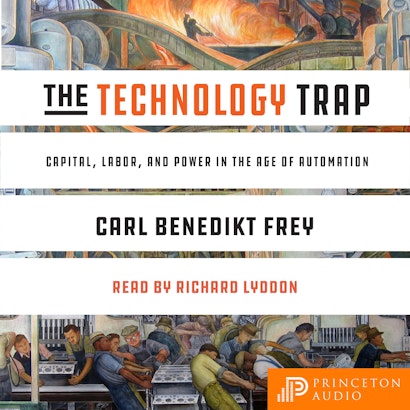"The Technology Trap may well ensnare doom-seekers’ attention with its ominous-sounding title. But it should ultimately hearten anyone who reads it."—The Economist
"Anybody interested in the economic impact of digital and AI, in particular on jobs, will want to read [The Technology Trap]."—Diane Coyle, Enlightened Economist
"[Frey] takes a provocative, original long view on current concerns, examining the fallout from past technological advances . . . to mass production and artificial intelligence."—Andrew Hill, Financial Times, Summer Books of 2019
"I have been lost in [The Technology Trap] for the last 10 days."—John Harris, The Guardian
"Frey’s analysis is worth taking seriously because the Oxford economic historian and economist has researched his subject deeply and has co-authored one of the most widely cited studies on automation . . . . Frey’s story is well argued and — at times — deeply alarming about the stability of western democracies given he predicts the further concentration of wealth in a few hands and in even fewer locations"—John Thornhill, Financial Times
"An excellent analysis of past industrial revolutions, the technologies that emerged within them, and the way societies adapted to those changes."—Adi Gaskell, Forbes
"As [Frey] points out in his new book The Technology Trap, for all that the robots may make the world more local, they may have other painful side-effects, putting millions of people out of work and sparking an almighty backlash."—Ed Conway, The Times
"The Technology Trap is the perfect book for higher ed people to read . . . . deeply researched and [convincingly] argued."—Joshua Kim, Inside Higher Education
"If you're an optimist about the robotic future, you likely hear talk that we're all going to lose our jobs or suffer a big pay cut, and tell friends to relax — the new technology revolution is going to turn out like all the others since the dawn of the Industrial Age. But if history is your best hope, you should probably think again: [The Technology Trap has] a strong case."—Steve Levine, Axios
"Anybody interested in the economic impact of digital and AI, in particular on jobs, will want to read Carl Frey’s new book."—Diane Coyle, Enlightened Economist
"In his bracing new book The Technology Trap, Carl Frey extrapolates from the history of the industrial revolution to offer a vision of the future in which Amazon Go, AI assistants and autonomous vehicles are 'worker replacement' technologies."—Greg Williams, Wired
"A fascinating history of technical change."—Chris Dillow, Stumbling and Mumbling
"One of Frey’s most salient points is that our attitudes and actions toward technology can play a pivotal role in how it impacts us. A lot of stock has been put into Frey and Osborne’s prediction of 47 percent automation. But if Frey’s book gets even half the attention the paper got, it should serve to quell some of our fears around a bleak machine-dominated future."—Vanessa Bates Ramirez, Singularity Hub
"Carl Benedikt Frey has written an important and timely book . . . . A great deal of effort, thought, and scholarship went into its writing, and it shows. There is much food for thought here and I can envision this assigned in upper division economics classes as well as some graduate courses."—Alexander Field, EH.net
"Frey offers a refreshingly human-centered analysis of technological progress."—Oscar Schwartz, Stanford Social Innovation Review
"It’s clear The Technology Trap has plenty to teach us, and should automatically be on the reading list of any serious policy maker or politician."—Ben Ramanauskas, Cap X
"Frey explores automation and its consequences, taking the reader on a long sweep of UK and US industrial history that demonstrates the distinction between labour-enabling and labour-replacing technologies. . . As arguably the most comprehensive account of automation to date, this book deserves to be read widely"—Liam Kennedy, London School of Economics Review of Books
"[The Technology Trap] offers a fascinating history of technology’s effects on employment from the Industrial Revolution to today and attempts to tackle how we might avoid a repeat of past social ills, as the Computer Revolution sweeps away a majority of human jobs."—Robert Elliott Smith, Medium
"Narrator Richard Lyddon performs an almost impossible feat—making a very theoretical audiobook sound absorbable in a truly entertaining way . . . . Cheers to both Frey and Lyddon, a pairing that listeners may wish to hear again."—AudioFile Magazine
"An extremely useful history of the effect of technology on jobs and income inequality."—John Judis, The National Interest
"[E]rudite and thoughtful, and the questions [The Technology Trap] raises are important and pertinent."—Joel Mokyr, Journal of Economic History
"[Frey] investigates the short, medium, and long-term consequences of the Industrial Revolution on workers, finding that in fact the changes had extraordinarily negative consequences in the short term. His lessons from this pivotal moment in history can help technology leaders avoid the biggest risks today in how we design human/AI systems in the coming age of automation."—TechCrunch
"I highly recommend [The Technology Trap]."—Randal C. Picker
"There is little reason to doubt the contemporary relevance of Frey’s analysis into the consequences of automation on the labour market, and the broader socio‐political implications of those technological changes which are highly anticipated to reshape our working lives and economic existence as we know it. The voluminous public commentary about technology, and public protests against the ramifications of technology change (such as taxi drivers decrying peer‐to‐peer ride‐sharing services which rely on smartphone apps), serve as sufficient warrant to pay attention to Frey’s contribution."—Mikayla Novak, Economic Record
"Excellently written, full of examples and studies I hadn't previously encountered, and I learned a lot."—Tim Harford
"[The Technology Trap] is a reminder that the future of work depends on policy choices. It is well worth reading."—Ravi Venkatesan, Book Review Literacy Trust
"A . . . danger is that Luddite efforts to avoid the short-term costs associated with a new technology will end up denying access to its long-term benefits—something Carl Benedikt Frey, an Oxford academic, calls a 'technology trap'."—The Economist
"Excellent."—Masood Ahmed, CGD Policy Blog
"Magisterial."—Chris Gibbons, Acumen
"Frey’s observations and detailed historical analysis are useful for even those of us who cling to a more optimistic view of the long run."—Micheal Munger, Law & Liberty
"[A] historical odyssey."—Jane Humphries and Benjamin Schneider, Project Syndicate
"Frey provides a longue durée examination of the economic, social, and political interplay that drives technological change. Careful, erudite, elegantly written, and full of insight, the book sets the current overwrought debate about automation and AI on a firm contextualized footing."—Jayati Ghosh, Project Syndicate
"Frey’s book is a history with a policy purpose . . . the book reveals an enormous scope of reading."—Kenneth Lipartito, American Historical Review
"Will machines equipped with artificial intelligence render the human race redundant? Is work as we know it about to end? The Technology Trap draws on the experiences of the first and second Industrial Revolutions, and the first Computer Revolution, to answer some of the burning questions of our time. Frey’s key point—that technological disruption of the labor market is usually painful in the short run, whatever innovation’s long-run benefits—is of vital importance to voters and policymakers alike." —Niall Ferguson, author of The Square and the Tower
"The Technology Trap is a subtle, wide-reaching exploration of the relationship between technology and labor over centuries of history. Frey shows how the impacts of automation upon the British and American workforce have been shaped by changing power structures. In its attention to the detailed determinants of change, his book is a hugely welcome antidote to today’s surfeit of sweeping predictions about the future of work."—Robert Skidelsky, University of Warwick
"In this book, Carl Frey brings a new perspective, that of historical experience, to tackle some of the most important issues of our time. Offering the clearest account that I have read in quite a while regarding current problems around employment, technology, economic performance, and globalization, Frey provides the technological background to Thomas Piketty’s analysis of inequality, Capital in the Twenty-First Century."—Jane Humphries, University of Oxford
"Carl Frey’s highly original, admirably engaging, and deeply researched book should be read by anyone interested in how technological change will disrupt not only our jobs, but also our politics and society. By comparing the current age of disruptive technological change with the Industrial Revolution, The Technology Trap provides unique and timely insights which we ignore at our peril."—Ian Goldin, coauthor of Age of Discovery
“How will artificial intelligence affect the future of work? In The Technology Trap, Frey answers this question through a comprehensive, insightful analysis of the relationship between technological advances and work, from preindustrial society through the Computer Revolution. He predicts that intelligent machines will reduce the demand for human labor while yielding significant productivity gains. Societies will differ in how they choose to distribute these gains."—Laura Tyson, University of California, Berkeley

